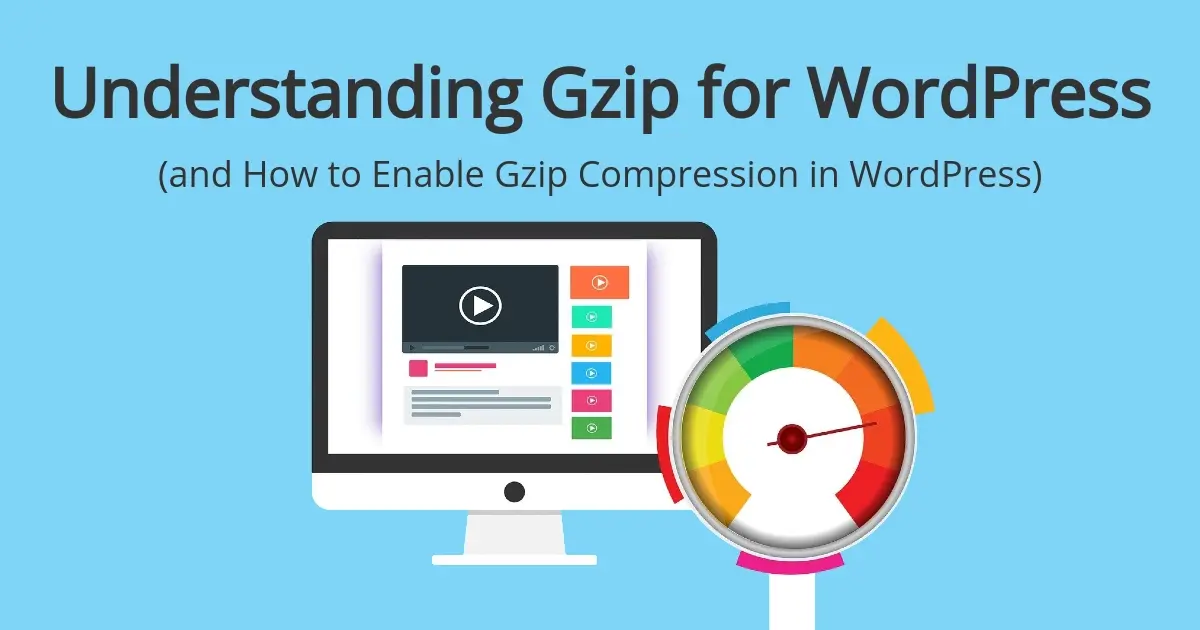The world of website optimization, especially when speeding up WordPress, is a lot to cover. Sometimes tools in speed optimization like Gzip for WordPress, are topics that need their own articles. In this article you’ll learn how to better understand Gzip for WordPress, but also how to enable Gzip compression for WordPress.
What is Gzip?
Optimizing file sizes for quicker loading times and reducing bandwidth usage is super important for any website owner. This is where Gzip comes into the picture. Gzip is a data compression method that significantly reduces the size of files, making data transfer faster and more efficient.
Gzip, short for GNU zip, is a popular data compression algorithm developed in the early 1990s by Jean-loup Gailly and Mark Adler. The main purpose of Gzip is to reduce the size of files before they are transmitted over the internet. This compression gives faster data transfer times and reduces bandwidth usage, which is super helpful for website owners and users. A smaller file size results in web pages loading faster, as well as enhancing the overall user experience and possibly improving search engine rankings.
The Gzip compression process works by finding repeated strings or patterns of data within a file and replacing them with shorter representations. This is achieved through two primary steps: the LZ77 algorithm and Huffman coding.
The first step, the LZ77 algorithm, scans the input file and searches for repeated sequences of characters. It then creates pointers to these recurring patterns, allowing the compressor to replace the repeated data with references to its previous occurrences. By doing so, the file becomes more compact.
In the second step, Huffman coding is applied to the data. Huffman coding is a variable-length encoding technique that assigns shorter codes to more frequently occurring characters and longer codes to less frequent ones. This further reduces the size of the file by using shorter representations for common data and longer representations for less common data.
Gzip is widely used in web development to compress various file types, such as HTML, CSS, JavaScript, and JSON, among others. When a web server receives a request from a user's browser, it can check if the browser supports Gzip compression. If it does, the server compresses the requested file using Gzip before sending it over the internet. Upon receiving the compressed file, the browser then decompresses it before displaying the content to the user.
While Gzip offers significant benefits, it is worth noting that it is most effective on text-based files, such as HTML and CSS. Binary files, like images, videos, and already compressed files (e.g., JPEG or MP3), do not experience significant compression gains with Gzip and may even increase in size slightly due to overhead.
What is Gzip for WordPress?
Gzip for WordPress is a powerful tool that significantly reduces the size of website files, leading to faster loading times and improved user experiences. In this article, we will explore what Gzip for WordPress is, how it works, and why it is crucial for website optimization. Gzip is a compression method that effectively reduces the size of files, such as HTML, CSS, JavaScript, and JSON, by compressing them into a smaller format.
When a user visits a WordPress website, their browser sends a request to the web server, which then responds by sending the requested files, such as HTML, CSS, and JavaScript, back to the browser. Before Gzip compression, these files are typically in their uncompressed form, resulting in larger file sizes that take longer to transfer over the internet.
Here's where Gzip for WordPress comes into play. When a web server that hosts a WordPress site is configured to use Gzip compression, it checks if the user's browser supports Gzip. If the browser supports it, the server compresses the requested files on the fly using Gzip before sending them to the user's browser. If the browser does not support Gzip, the server sends the uncompressed files as usual.
The compressed files received by the user's browser are much smaller than the original ones. As a result, the time it takes to transfer the files over the internet is significantly reduced. This leads to faster loading times for web pages, which is critical for keeping users engaged and satisfied.
The benefits of Gzip for WordPress are far-reaching. Faster loading times not only enhance the user experience but also have a positive impact on search engine rankings. Search engines like Google consider website speed as one of the ranking factors. Websites that load quickly are more likely to rank higher in search results, potentially driving more organic traffic to the site.
How to Enable Gzip Compression in WordPress
There are 2 methods to enable Gzip compression in WordPress:
- Using a plugin
- Using code
If you’re not knowledgeable in handling code, the plugin method may be best for you. With either method, before you apply any changes, make sure to backup your WordPress site.
How to Enable Gzip Compression in WordPress: Using a plugin
This method assumes that you haven’t installed a cache plugin. It’s best to make sure that you don’t already have one installed. If you do, then look through that plugin’s settings to make sure gzip compression is turned on. In some cases, you might need to look up the plugin’s documentation in order to learn how to enable Gzip compression in WordPress.
- Log into your WordPress admin dashboard.
- Navigate to "Plugins" in the left-hand menu and click "Add New."
- In the search bar, type WP Super Cache.
- Install and activate the WP Super Cache plugin.
- Once activated, go to the plugin's Advanced tab settings, and select the box to "Compress pages so they're served more quickly to visitors."
- Save settings.
How to Enable Gzip Compression in WordPress: Using code
This method assumes that you’re comfortable handling code, and your web host allows you to add code that will enable Gzip compression. For this tutorial, you'll either need to log into your web host and use the File manager, or use a FTP client like Filezilla to make the changes needed to enable Gzip compression in WordPress.
Step 1. Navigate to the root directory of your WordPress installation (usually named "public_html").
Step 2. In the root directory, look for a file named ".htaccess." This is a hidden file, so make sure your file manager settings show hidden files.
Step 3. Right-click on the ".htaccess" file, and select "Edit" or "Code Edit" from the context menu. Alternatively, you can download the file to your computer, edit it using a text editor, and then upload it back to the server.
Step 4. Add the following lines at the beginning of the ".htaccess" file to enable Gzip compression:
<IfModule mod_deflate.c>
# Enable Gzip compression for commonly used file types
AddOutputFilterByType DEFLATE text/plain
AddOutputFilterByType DEFLATE text/html
AddOutputFilterByType DEFLATE text/xml
AddOutputFilterByType DEFLATE text/css
AddOutputFilterByType DEFLATE application/xml
AddOutputFilterByType DEFLATE application/xhtml+xml
AddOutputFilterByType DEFLATE application/rss+xml
AddOutputFilterByType DEFLATE application/javascript
AddOutputFilterByType DEFLATE application/x-javascript
AddOutputFilterByType DEFLATE application/json
</IfModule>
Step 5. Save your .htaccess file.
You may want to clear your website and browser cache after applying this code in order for it to properly take effect.
In Summary
Now that you know about Gzip for WordPress, check to see if you have any caching turned on for your site. You may want to check to see if Gzip is an option in your cache plugin. If you don’t have it, use this article to help you enable Gzip compression in WordPress.
Frequently Asked Questions
Why choose hosting for WordPress ?
WordPress is so popular because it allows people to create websites with total customization. With hundreds of apps available for one-click installations, creating something that’s eye-catching and unique is much easier with a CMS like WordPress. Learn more about WordPress optimized Hosting here.
What is hosting for WordPress?
Hosting for WordPress involves housing your website on servers dedicated to CMS WordPress. You can learn more about hosting for WordPress on our blog.
Can I use hosting for WordPress without a WordPress site?
Generally, no. The servers will be optimized to WordPress websites only, and those choosing a managed service will have to build their site using the platform.
Is managed hosting for WordPress worth it?
You want to make sure that your WordPress website is in the best hands, runs efficiently, and is secure. When you take into consideration all of the benefits that managed hosting for WordPress has, it is definitely worth the investment.

Nile Flores is a long time professional blogger, as well as WordPress website designer and developer from the St. Louis Metro East. Nile blogs at NileFlores.com, where she’s passionate about helping website owners, whether they’re small business owners or bloggers. She teaches about Blogging, Social Media, Search Engine Optimization, Website Design, and WordPress. Additionally, Nile loves to speak at WordCamps (WordPress conferences) across the United States. When Nile isn’t knee-deep in coding, she’s a proud mom of a college student, and enjoys oil painting, cigar smoking, nail art design, and practicing traditional Okinawan kempo karate.
View all posts by Nile Flores



















